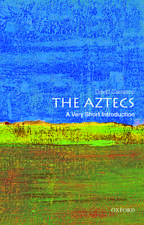The Permissive Society: America, 1941–1965
Autor Alan Petignyen Limba Engleză Paperback – 9 aug 2009
| Toate formatele și edițiile | Preț | Express |
|---|---|---|
| Paperback (1) | 227.12 lei 6-8 săpt. | |
| Cambridge University Press – 9 aug 2009 | 227.12 lei 6-8 săpt. | |
| Hardback (1) | 572.21 lei 6-8 săpt. | |
| Cambridge University Press – 30 iul 2009 | 572.21 lei 6-8 săpt. |
Preț: 227.12 lei
Nou
Puncte Express: 341
Preț estimativ în valută:
43.46€ • 44.84$ • 36.27£
43.46€ • 44.84$ • 36.27£
Carte tipărită la comandă
Livrare economică 26 martie-09 aprilie
Preluare comenzi: 021 569.72.76
Specificații
ISBN-13: 9780521757225
ISBN-10: 0521757223
Pagini: 304
Ilustrații: 32 b/w illus. 2 tables
Dimensiuni: 152 x 229 x 17 mm
Greutate: 0.48 kg
Editura: Cambridge University Press
Colecția Cambridge University Press
Locul publicării:New York, United States
ISBN-10: 0521757223
Pagini: 304
Ilustrații: 32 b/w illus. 2 tables
Dimensiuni: 152 x 229 x 17 mm
Greutate: 0.48 kg
Editura: Cambridge University Press
Colecția Cambridge University Press
Locul publicării:New York, United States
Cuprins
Introduction: rising expectations and the challenge from World War II; 1. Psychology: Benjamin Spock, Carl Rogers, and the liberalizing impulse in the 1950s; 2. Religion: ballrooms, bingo, blue laws and Billy Graham - piety and secularization in 1950s America; 3. Sex: Ingrid Bergman, Elizabeth Taylor and the sexual revolution in the postwar period; 4. Women: the rising status of women in the age of Eisenhower; 5. The youth culture: rock 'n roll, blue jeans, and the myth of opposition; 6. From original sin to self actualization: Jackson Pollock, Charlie Parker, and new notions of identity in postwar America; 7. Denouement: the normative lag and the role of religion in the transformation of American culture.
Recenzii
'Alan Petigny has pulled back the camera to project a wider angle on a series of dramatic changes generally associated with the 1960s. From the sexual revolution to the decline of faith, Petigny illustrates the slow evolution of values that permeated American culture from World War II to the 1970s and that shape the world we live in today. In doing so, The Permissive Society emphasizes the crucial role played by psychology and the 'therapeutic ethos.' Petigny also reminds us of the often-neglected role of adults - not just youth culture - in driving the changes that produced a cultural revolution.' Brian Balogh, University of Virginia and author of A Government Out of Sight
'Challenging conventional views of early postwar America as a conservative, conformist, and somnolent era, Alan Petigny finds a ferment of shifting social codes, more tolerant child-rearing practices, evolving religious thought, changing views of women's roles, and a vogue for self-actualization. Boldly provocative and wide-ranging in coverage - from bingo and blue jeans to Peale, Spock, and Niebuhr - The Permissive Society invites us to look afresh at an era that Petigny finds more complex, and more interesting, than we had thought.' Paul Boyer, author of By the Bomb's Early Light: American Thought and Culture at the Dawn of the Atomic Age
'Alan Petigny audaciously challenges our understanding of the 1950s as a time of staid tradition. With a fine eye for detail, he shows a turbulent decade in which sexual mores, the role of women, ideas of child rearing, conceptions of God and the place of religion in society, and psychological assumptions of self-worth underwent profound, and sometimes destructive, change. This is an important book.' Donald T. Critchlow, Saint Louis University
'In the past few years, historians have begun to disassemble the stereotypes of the 1950s, rejecting the descriptions of a uniformly rigid, conservative, and dour society. With Alan Petigny's astute and surprising book, this demolition project hits with full force. Focusing on liberal religion and the widespread popularity of psychology, counseling, and the ideals of identity-fulfillment, the author describes a very different society in the making, in which permissive behavior rejected the strident calls for Cold War conformism. Contrarian in the very best sense of the term, this remarkable book transforms what we thought we knew about the postwar world, restoring balance, common sense, and dispassionate perspective to the history of the period.' James Gilbert, University of Maryland
'In The Permissive Society, Petigny finds new indicators of behavioral change in sources neglected by cultural historians. His documentation of a permissive turn in the 1940s and 1950s provides a marvellous antidote to the naïve narratives of social change that clutter the canon of post-World War II cultural history. Both conservatives and progressives will benefit from careful study of this fascinating lesson in how cultural norms changed in response to new social realities.' James Reed, Rutgers University
'With The Permissive Society, Alan Petigny gives revisionist history a good name. With freshness of perspective, deftness of design, and ingenuity of research, he proposes to find in the 1950s the seeds of the democratic change associated with the 1960s - and thus makes both decades more intriguing. The Permissive Society is a work that social and cultural historians of the postwar era will have to reckon with, and that anyone interested in a cogent scholarly argument is bound to enjoy.' Stephen J. Whitfield, Brandeis University
'Alan Petigny is a gifted scholar who has meticulously reconstructed the history of the 1950s. Petigny argues persuasively that the 1950s were not truly conservative. Unlike other revisionist accounts that lean heavily on anecdotes, this intellectual history is firmly rooted in statistics that hold persuasive power. Drawing examples from religion, psychology, child rearing, and youth culture, Petigny perceptively shows that the 1950s were part of a century-long liberal shift.' W. J. Rorabaugh, author of Kennedy and the Promise of the Sixties (Cambridge University Press University of Washington, 2002).
'Challenging conventional views of early postwar America as a conservative, conformist, and somnolent era, Alan Petigny finds a ferment of shifting social codes, more tolerant child-rearing practices, evolving religious thought, changing views of women's roles, and a vogue for self-actualization. Boldly provocative and wide-ranging in coverage - from bingo and blue jeans to Peale, Spock, and Niebuhr - The Permissive Society invites us to look afresh at an era that Petigny finds more complex, and more interesting, than we had thought.' Paul Boyer, author of By the Bomb's Early Light: American Thought and Culture at the Dawn of the Atomic Age
'Alan Petigny audaciously challenges our understanding of the 1950s as a time of staid tradition. With a fine eye for detail, he shows a turbulent decade in which sexual mores, the role of women, ideas of child rearing, conceptions of God and the place of religion in society, and psychological assumptions of self-worth underwent profound, and sometimes destructive, change. This is an important book.' Donald T. Critchlow, Saint Louis University
'In the past few years, historians have begun to disassemble the stereotypes of the 1950s, rejecting the descriptions of a uniformly rigid, conservative, and dour society. With Alan Petigny's astute and surprising book, this demolition project hits with full force. Focusing on liberal religion and the widespread popularity of psychology, counseling, and the ideals of identity-fulfillment, the author describes a very different society in the making, in which permissive behavior rejected the strident calls for Cold War conformism. Contrarian in the very best sense of the term, this remarkable book transforms what we thought we knew about the postwar world, restoring balance, common sense, and dispassionate perspective to the history of the period.' James Gilbert, University of Maryland
'In The Permissive Society, Petigny finds new indicators of behavioral change in sources neglected by cultural historians. His documentation of a permissive turn in the 1940s and 1950s provides a marvellous antidote to the naïve narratives of social change that clutter the canon of post-World War II cultural history. Both conservatives and progressives will benefit from careful study of this fascinating lesson in how cultural norms changed in response to new social realities.' James Reed, Rutgers University
'With The Permissive Society, Alan Petigny gives revisionist history a good name. With freshness of perspective, deftness of design, and ingenuity of research, he proposes to find in the 1950s the seeds of the democratic change associated with the 1960s - and thus makes both decades more intriguing. The Permissive Society is a work that social and cultural historians of the postwar era will have to reckon with, and that anyone interested in a cogent scholarly argument is bound to enjoy.' Stephen J. Whitfield, Brandeis University
'Alan Petigny is a gifted scholar who has meticulously reconstructed the history of the 1950s. Petigny argues persuasively that the 1950s were not truly conservative. Unlike other revisionist accounts that lean heavily on anecdotes, this intellectual history is firmly rooted in statistics that hold persuasive power. Drawing examples from religion, psychology, child rearing, and youth culture, Petigny perceptively shows that the 1950s were part of a century-long liberal shift.' W. J. Rorabaugh, author of Kennedy and the Promise of the Sixties (Cambridge University Press University of Washington, 2002).
Notă biografică
Descriere
The Permissive Society points to the emergence of a liberalizing impulse during the 1950s, with a traditionalist moral framework giving way to a less authoritarian approach to moral issues.









